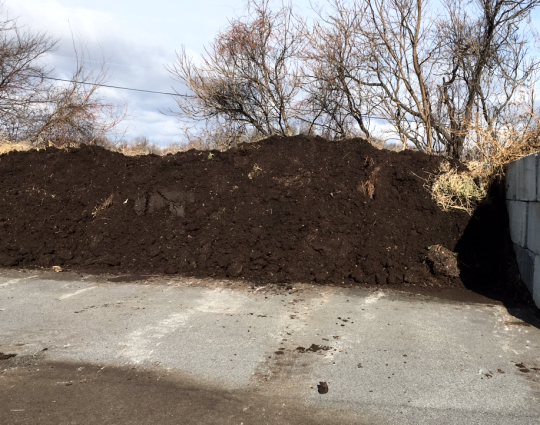 A pile of Maryland State Highway Administration compost, made from deer carcasses, manure and wood chips. (Courtesy of Charlie Gischlar/Maryland State Highway Administration)
A pile of Maryland State Highway Administration compost, made from deer carcasses, manure and wood chips. (Courtesy of Charlie Gischlar/Maryland State Highway Administration)ANNAPOLIS (December 06, 2018)—Deer are acting up for mating season—and while that means more collisions with motorists and more roadkill, for the State Highway Administration, it also means more compost.
Spokesman Charlie Gischlar said the administration has been turning dead deer into compost since 2004, when the program started in Carroll County, Maryland. Now, there's a second facility in Frederick County, Maryland, that helps in the effort.
The recipe is simple—deer carcasses, manure and wood chips. Let that decompose long enough, and you've got compost.
Gary Felton, an associate professor and agricultural extension specialist with the University of Maryland for almost 25 years, said the deer concoction checks all the boxes of a good compost—but it suffers from two major problems.
"Big bones don't decompose very fast, so you end up with big bones if you don't sift (the compost)," Felton said. "That's a common thing to do, but for the State Highway Administration, that means more money."
And the second problem he listed is exactly what you'd imagine: "The concept that people have of 'yuck, that's a dead body.'"
The deer compost naturally heats up to temperatures between 130 and 160 degrees Fahrenheit when the microbes in the mix are consuming carbon, Felton said, so the final product is pathogen-free.
Even so, Gischlar said, the mix is only used to enrich native wildflowers near roads.
Felton, who has advised the administration on their compost, said this year the mix was also extended to growing turf in medians and beside roads—and that even though it was safe to use on all plants, those two projects used up the State Highway Administration's supply of deer compost.
There's no one place to find the number of deer struck by motorists in Maryland per year, but administration data shows that between January and October of this year, their workers have responded to 9,800 reports of deer carcasses on state roads.
Data from the State Highway Administration showed that its response teams picked up 1,327 deer and animal carcasses between October and December 2015, and 1,807 between October and December 2016. Numbers for 2017 were not available.
Representatives for the agency said they were revamping the way they recorded dead animal pickups, which could account for some of the discrepancies between this year's data and that of previous years.
Gischlar said the deer that are not composted are either buried or given to outside rendering companies.
According to State Farm statistics, American drivers in general had a one in 167 chance ( newsroom.statefarm.com/2018-deer-crashes-down/ ) of hitting a deer, elk, moose or caribou while driving this year—and Marylanders in particular had a one in 138 chance of being in a deer-related collision. The insurance agency says these numbers are slightly down from 2017 statistics.
Allan Corman, an administrative assistant for Bowie, Maryland's animal control office, said since October, he's fielded about 15 deer calls. He said many calls are about "potentially injured" deer, which turn out to be fawns that are lying down in people's yards.
"The fawns are actually taught to stay still, to lay down and stay still," Corman said. "Most of the time … 'mom' is within 200 feet of the deer, looking for food."
According to Corman, Bowie takes its dead deer to a designated area of the city to naturally decompose.
John Simpkins, the owner of Mid-Atlantic Wildlife Control, a company that removes animals from people's private property, said deer removal calls came in two waves that correspond with hunting seasons: September through October, and the weekend after Thanksgiving through the second or third week of December.
He said Mid-Atlantic Wildlife Control charges $295 to remove dead deer, because they have to dispose of the carcasses at private animal crematoriums.


